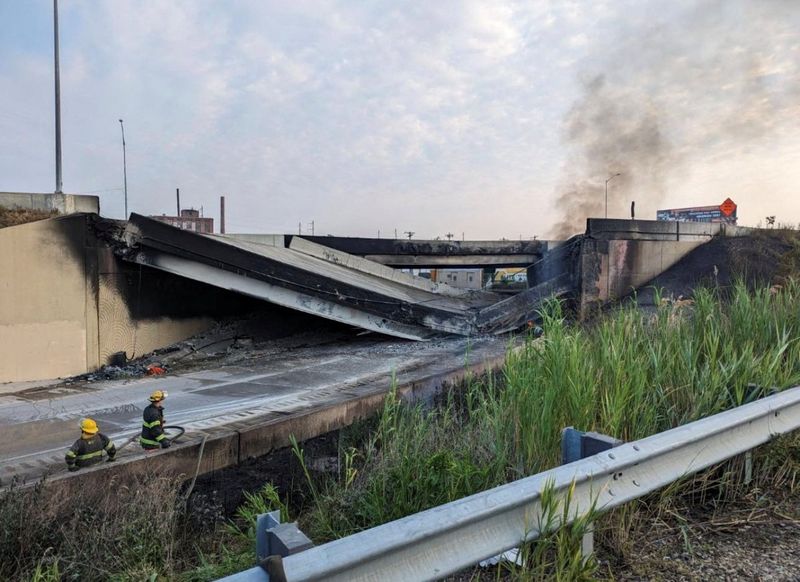By Jarrett Renshaw
PHILADELPHIA (Reuters) - A portion of a vital highway on the East Coast of the U.S. collapsed in Philadelphia after a tanker truck carrying gasoline caught fire underneath an overpass, officials said on Sunday.
No deaths or injuries were reported, but officials said the situation remains fluid and that investigators were still searching the scene of the collapse.
Smoke billowed from the rubble of the collapsed section of the northbound lanes of I-95, the main north-south interstate on the East Coast, running from Miami through Washington and New York before ending at the Canadian border in the state of Maine. The southbound overpass was closed as the fire made it structurally unsound, officials said.
Pennsylvania Gov. Josh Shapiro said at a press conference that it would likely take "some number of months" to fully rebuild the roadway, over which roughly 160,000 vehicles pass daily. He said he would sign a disaster declaration on Monday, freeing up federal funds and other help.
Shapiro said the tanker was carrying a "petroleum product" but would not offer more details. The U.S. National Transportation Safety Board (NTSB) said the tanker was carrying gasoline. NTSB sent a team to investigate.
Shapiro said that while a "very light sheen" could be seen in the Delaware River near where the gasoline tanker caught fire indicating some gasoline may have spilled into it, booms were quickly put into the water to contain the spread.
"There is no threat to anyone's drinking water," Shapiro said.
U.S. President Joe Biden was briefed on the collapse and the White House has offered assistance to state and local officials, according to White House press secretary Karine Jean-Pierre.
U.S. Transportation Secretary Pete Buttigieg said the closure of I-95 will have "significant impacts" on the region and the city of Philadelphia.
This stretch of the I-95 corridor sits in the dense northeast section of Philadelphia and connects the city to its northern suburbs, such as Bucks County.

On a Sunday in the summer, it is routinely used by beachgoers coming home from the Jersey Shore. During the week, it is crowded with commuters and vehicles traveling to Boston, Baltimore and Washington.
Officials said travelers should expect delays and encouraged them to plan alternate travel routes, including trains, for their commutes.